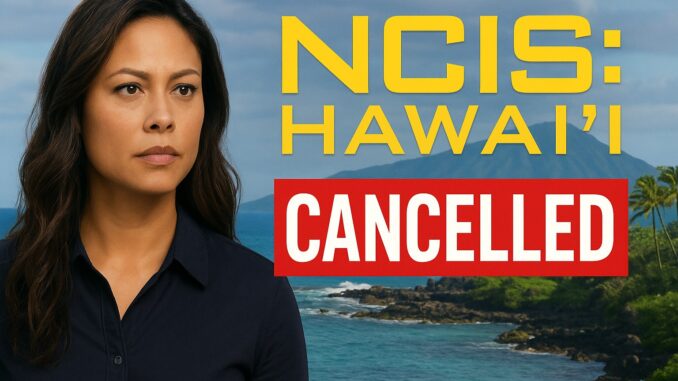
Hawaiʻi has long been a beloved backdrop for television. Lush landscapes, ocean views, vibrant culture—TV shows set (or filmed) in the islands draw viewers in like moths to a flame. But as of 2024–2025, something almost unthinkable has happened: Hawaiʻi has nothing. No big network TV series in production. Nada. How did we get here? And what does it mean for the people, the economy, and the stories that used to flow from the islands?
What Happened to NCIS: Hawaiʻi
The Rise—A Female-Led, High-Profile Spin-Off
NCIS: Hawaiʻi launched in 2021. It was the first NCIS series to put a woman, Vanessa Lachey, in the lead as Special Agent Jane Tennant. It had strong support, good viewership, and all the ingredients people expect from a classic procedural with island flair.
Why It Was Cancelled in 2024
Several reasons contributed:
-
Financial considerations: the cost of filming in Hawaiʻi is high.
-
Ratings and performance: while the show maintained millions of viewers, it apparently didn’t reach the thresholds for renewal in a season when the network was streamlining.
-
Network strategy: CBS was making “tough choices” to refresh its lineup, and with new NCIS universe-projects in development, they decided to fold Hawaiʻi. The Immediate Fallout
-
Final season (Season 3) wrapped with just 10 episodes, fewer than usual, due in part to writer and actor strikes.
-
Cast and crew were blindsided. Vanessa Lachey described being “gutted, confused, blindsided.” Fans were frustrated by what many considered an abrupt ending.
Rescue: HI-Surf – A One-Season Lifeguard Drama That Left Too Quickly
What Rescue: HI-Surf Was About
This show followed a team of lifeguards working on the North Shore of Oʻahu—local actors, local crew, stories tied to Hawaiian water safety, culture, and community. It premiered in September 2024, and its first season had 19 episodes.
Cancellation After One Season
In May 2025, Fox cancelled Rescue: HI-Surf. Despite its commitment to using Hawaiʻi-based talent both in front of and behind the camera, the show couldn’t survive the cost versus return realities.
What It Meant for Local Filmmakers & Crew
-
Over 90% of Rescue: HI-Surf’s crew were locals—actors, stuntmen, water crew, lifeguards. Jobs mattered. Those positions evaporated with the cancellation.
-
Many feel the state didn’t do enough to raise the attractiveness of Hawaiʻi for TV production through tax incentives.
Hawaiʻi’s TV Void: First Time in 20+ Years
Historical Significance
For more than two decades, Hawaiʻi has nearly always had at least one major TV show filming—Magnum P.I., Hawaii Five-0, NCIS: Hawaiʻi, Rescue: HI-Surf. Now, with both recent cancellations, that streak is broken.
-
Local businesses that supported cast and crew—hotels, catering, transport, shore-locations—lose revenue.
-
Skilled professionals in filming, lifeguarding, stunt work, water safety face fewer opportunities locally. Many may have to leave Hawaiʻi to work elsewhere.
Underlying Reasons — Why Hawaiʻi Lost Out
Tax Incentives & Government Policy
Hawaiʻi offers tax credits (22% for Oʻahu, 27% for neighbor islands). But during the recent legislative session, a bill that might have raised those incentives to match more competitive states was deferred. This means Hawaiʻi is less financially appealing compared to places like Atlanta, Vancouver, or even Australia.
Production Costs and Logistical Hurdles
Shooting in Hawaiʻi brings extra expenses—importing equipment, moving crew, housing, transportation across islands, insurance, etc. When ratings or revenues aren’t high enough, those costs look prohibitive. It becomes a balancing act that sometimes doesn’t tip in Hawaiʻi’s favor.
Industry and Global Pressures
-
After the COVID-19 pandemic, plus writers’ and actors’ strikes, production costs globally have gone up.
-
Streaming wars are still making networks pick and choose which shows to back heavily. New projects (prequels, spin-offs) often win the investment battles. Hawaiʻi’s shows got caught in that wave.
Reactions — From Fans to Officials
Community & Cast Response
Fans are upset. Many feel NCIS: Hawaiʻi didn’t get a proper goodbye. Vanessa Lachey and other cast members expressed sorrow. Others shared clips of the now-overgrown Hawaii Film Studio lot, evoking images of memories and loss.
Industry Alarms
Local film and TV workers sounded warnings: without shows, many lose livelihoods. Some are considering leaving. Others argue that Hawaiʻi needs to do more to hold on to the creative ecosystem.
Government and Policy Moves
Gov. Josh Green has expressed concern. There’s talk of preserving or strengthening tax credits for film/TV, not only for entertainment value but as a driver of economic activity and cultural exposure.

What’s Next for Hawaiʻi? Is There Hope?
Potential Shows in Development
There are whispers of indie features, reality series, maybe even new scripted shows trying to fill the void. However, nothing major seems solid right now.
The Case for Stronger Incentives
If Hawaiʻi wants to stay on the map for TV production, pushing tax credits upward, simplifying permitting, and supporting local infrastructure are essential. Otherwise, Hawaiʻi is at risk of being “too expensive” in the eyes of producers.
Reimagining Hawaiʻi’s Media Identity
Maybe the future isn’t only big network shows. Streaming, digital series, local content produced for smaller platforms could help Hawaiʻi preserve its storytelling traditions—even if global blockbuster shows become rare.
Key Takeaways — The Big Picture
-
NCIS: Hawaiʻi and Rescue: HI-Surf both got cancelled in 2024-2025. One after three seasons, the other after one.
-
With their endings, Hawaiʻi is experiencing the first time in ~20 years with no major TV series in production.
-
The reasons aren’t just creative; they’re deeply economic: cost of production, tax incentive competition, network strategy, global pressures.
-
The impact isn’t just on viewers—it hits cast, crew, local economy, cultural visibility.
Conclusion
Losing NCIS: Hawaiʻi and Rescue: HI-Surf wasn’t just a blow to TV schedules—it was a blow to the spirit and economic fabric of Hawaiʻi. These shows represented more than storytelling: local talent, culture, vistas that felt like home, jobs, pride. Now, with Hawaiʻi standing TV-empty for the first time in decades, it’s clear change is needed.
But this moment doesn’t have to be purely one of loss. If policymakers act, if local creators find new platforms, and if the industry reinvests in Hawaiʻi’s strengths—not just its scenery but its people—there’s a chance for rebirth. Until then, we sit in silence where once there was aloha on screen.
FAQs
1. Why exactly was NCIS: Hawaiʻi canceled even though it had millions of viewers?
Because viewership is only one part of the equation. The cost of filming in Hawaiʻi is high, production logistics are complex, and when networks are deciding on renewals, they consider not just ratings but financial sustainability, alternative shows, and overall strategy. For NCIS: Hawaiʻi, the scales tipped toward “no more seasons.”
2. Could Rescue: HI-Surf have been renewed under different circumstances?
Possibly. If the tax incentives were stronger, or if production costs were lower, or if streaming revenues or network support were more robust, it might’ve stood a better chance. But as things stand, the economics didn’t align.
3. What does this mean for the crews and local talent in Hawaiʻi?
It means many face unemployment or have to move out of state to find work. They lose years of experience and opportunities, which is bad for individuals—and bad for the industry infrastructure in Hawaiʻi.
4. How do Hawaiʻi’s tax breaks compare to places competing for TV/film business?
Hawaiʻi’s tax credits are decent (22%–27%), but many U.S. states and international locations offer more generous or more flexible incentives. The deferral of bills to boost incentives only makes things harder.
5. Is there any chance NCIS: Hawaiʻi or Rescue: HI-Surf will return someday?
As of the latest statements, CBS made it clear NCIS: Hawaiʻi has no plans for revival or move to another platform. Rescue: HI-Surf’s future is also uncertain. While fans hope, there are no confirmed renewals or plans in place.
